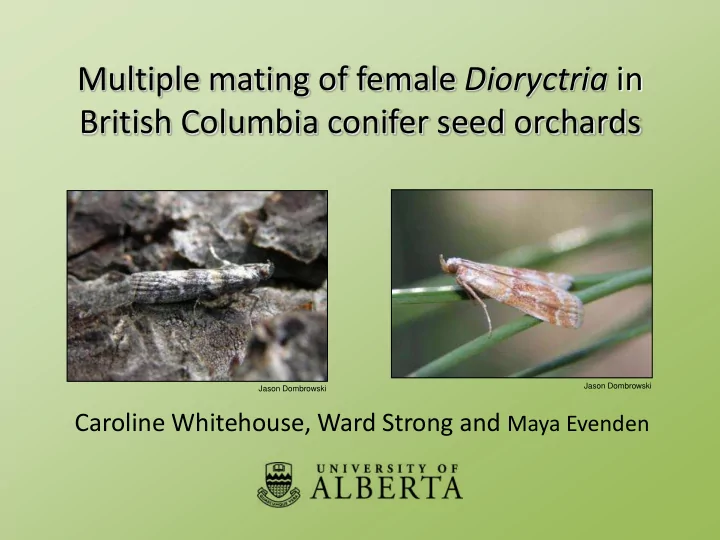

Multiple mating of female Dioryctria in British Columbia conifer seed orchards Jason Dombrowski Jason Dombrowski Caroline Whitehouse, Ward Strong and Maya Evenden
Multiple mating theory • Levels of polyandry can vary widely among and within species • Fitness and evolutionary implications • Benefits to females are unclear • Direct and indirect benefits • Increasing female fecundity • Increased genetic variability en.wikipedia.org/wiki/Gryllus_bimaculatus
Influence of multiple mating on pest management Mating disruption using sex pheromones: • Prevention and temporal delay of mating • Occurrence and prevention of multiple mating www.btinternet.com/~micka.wffps/codling_moth.jpg www.hortnet.co.nz/key/keys/info/control/cmcontr/cm- disr.htm
Dioryctria Zeller (Lepidoptera: Pyralidae) • 40 North American species, 12 in British Columbia • Destructive pests on Pinaceae • Cone, foliage, cambium and wounds • Economically important Ward Strong Ward Strong
Objectives • Are female Dioryctria polyandrous? • Does the level of polyandry/monandry differ among species? • Within species does the occurrence of polyandry change throughout the season? • Does this seasonal pattern differ among species?
Methods • Light trapping conducted at two commercial and one research Douglas-fir seed orchards • June 19 - Sept 19, 2008 • May 4 – September 26, 2009 • Traps run 5 days/week and catch collected twice
Methods • Excise female genitalia • Identify to species group Ductus bursae • Count spermatophore number Bursa copulatrix
Species groups caught zimmermani gr. ponderosae gr. schuetzeella gr. abietella gr . Photo credits: Amanda Roe auranticella gr.
Mating status of females 5 1.00 19 0.90 354 Proportion of females trapped 0.80 114 0.70 0.60 34 Virgin Once mated 0.50 Multiply mated 0.40 0.30 0.20 0.10 0.00 abietella auranticella ponderosae schuetzeella zimmermani Species group
Poly- and monandrous females 3.00 Average number of spermatophores a 2.50 b 2.00 c 1.50 c c 1.00 0.50 0.00 abietella auranticella ponderosae schuetzeella zimmermani Dioryctria species groups
Frequency of rematings 1.0 abietella gr. 0.8 auranticella gr. Proportion of total females ponderosae gr. schuetzeella gr. 0.6 zimmermani gr. 0.4 0.2 0.0 0 1 2 3 4 5 6 7 Spermatophore number
Seasonal variation in mating frequency 3.50 abietella Weekly average spermatophore number auranticella 3.00 ponderosae schuetzeella 2.50 zimmermani 2.00 1.50 1.00 0.50 0.00 25 26 27 28 29 30 31 32 33 34 35 36 37 38 39 2009 2008 Week number
Seasonal variation in mating frequency F P species F= 5.04 0.01 weeknumber F= 0.38 0.97 species*weeknumber F= 1.12 0.39 abietella F= 1.02 0.45 auranticella F= 6.53 0.03 ponderosae F= 0.68 0.70 schuetzeella F= 1.99 0.06 zimmermani N/A N/A
Conclusions • abietella gr. and auranticella gr. are polyandrous • seasonal patterns differ • schuetzeella is monandrous • Mating frequency as a function of population density • Pest management concerns • Dioryctria useful as a model system for studying multiple mating
Future studies • Establish if polyandry = higher fecundity • Impact of male investment on female fitness and particularly female receptivity • Determine if seasonal increases in mating frequency could be a function of population density
Acknowledgements Torie Lewis, Faye, Natalka Melnyky Kalamalka Research Station staff Dr. Amanda Roe Members of the Evenden lab Dr. Felix Sperling Dr. Nadir Erbilgin Financial support from the Forest Investment Account funds administered by Forest Genetics Council of British Columbia Travel assistance provided by the Faculty of Graduate Studies and Research, University of Alberta http://www.softwood.org/Douglas%20Fir%20Web/eDougFir/EN/DougFir.htm
Recommend
More recommend